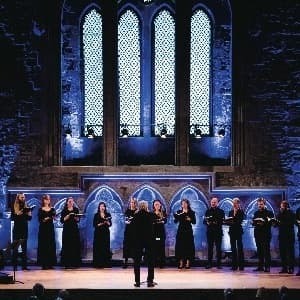CONCERTS WITH MOGENS DAHL CHAMBER CHOIR
SPRING SEASON 2026
Arvo Pärt's Passio or St. John's Passion is an iconic Passion work – a meditative journey through the story of Jesus' suffering, where the music opens up a spiritual inner world that draws threads to the church's oldest traditions. Like a single, unbroken breath, Passio invites contemplation and creates a space where time is suspended and makes room for reflection, communion and inner peace.
As a prelude to Easter, Mogens Dahl Chamber Choir with soloists and instrumentalists performs Arvo Pärt's St. John Passion Palm Sunday in Holmen Church
The genre of "Passion" itself is inextricably linked to Easter, as a Passion is a musical account of the suffering and death of Jesus, in most cases with text taken from one of the Gospels. The genre probably has its roots all the way back to late antiquity and the early Middle Ages, where the music was the unison Gregorian chant.
St. John's Passion is, in all its strict objectivity, one of the most beautiful and moving of Pärt's ecclesiastical works.

29 March 2026
Mogens Dahl Kammerkor / Arvo Pärt: Passio

30 January 2026
JUBILÆUMSKONCERT #3

13 December 2025
G.F. Händel Messiah

12 December 2025
G.F. Händel Messiah

2 November 2025
All Saints' Concert

21 September 2025
